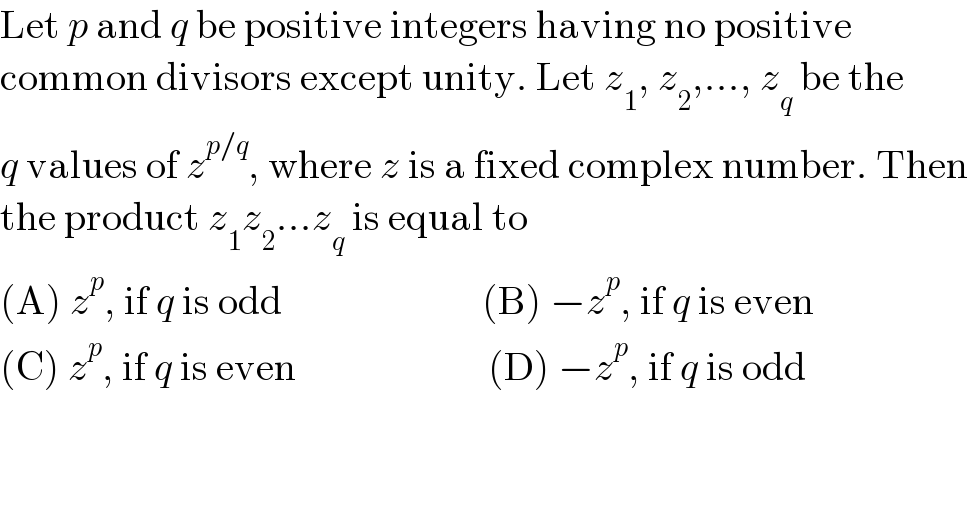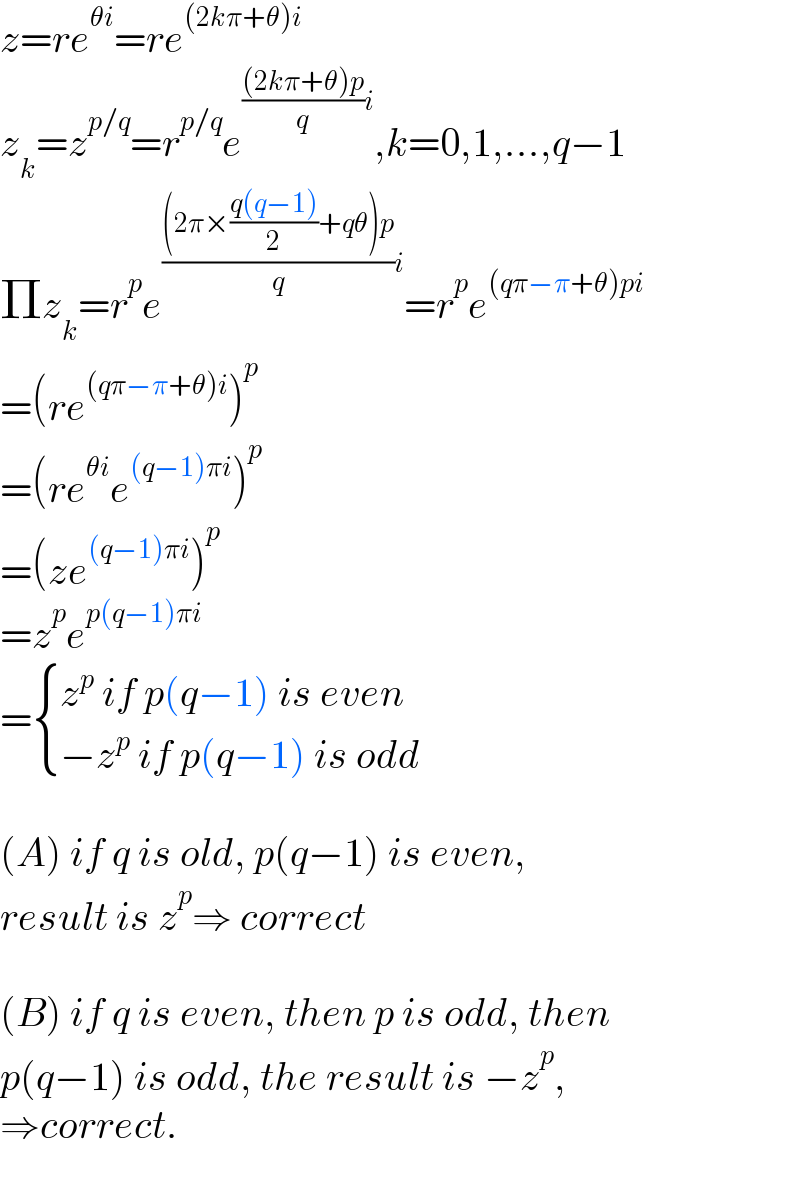
Question Number 140248 by EnterUsername last updated on 05/May/21

$$\mathrm{Let}\:{p}\:\mathrm{and}\:{q}\:\mathrm{be}\:\mathrm{positive}\:\mathrm{integers}\:\mathrm{having}\:\mathrm{no}\:\mathrm{positive} \\ $$$$\mathrm{common}\:\mathrm{divisors}\:\mathrm{except}\:\mathrm{unity}.\:\mathrm{Let}\:{z}_{\mathrm{1}} ,\:{z}_{\mathrm{2}} ,...,\:{z}_{{q}} \:\mathrm{be}\:\mathrm{the} \\ $$$${q}\:\mathrm{values}\:\mathrm{of}\:{z}^{{p}/{q}} ,\:\mathrm{where}\:{z}\:\mathrm{is}\:\mathrm{a}\:\mathrm{fixed}\:\mathrm{complex}\:\mathrm{number}.\:\mathrm{Then} \\ $$$$\mathrm{the}\:\mathrm{product}\:{z}_{\mathrm{1}} {z}_{\mathrm{2}} ...{z}_{{q}} \:\mathrm{is}\:\mathrm{equal}\:\mathrm{to} \\ $$$$\left(\mathrm{A}\right)\:{z}^{{p}} ,\:\mathrm{if}\:{q}\:\mathrm{is}\:\mathrm{odd}\:\:\:\:\:\:\:\:\:\:\:\:\:\:\:\:\:\:\:\:\:\:\:\:\:\left(\mathrm{B}\right)\:−{z}^{{p}} ,\:\mathrm{if}\:{q}\:\mathrm{is}\:\mathrm{even} \\ $$$$\left(\mathrm{C}\right)\:{z}^{{p}} ,\:\mathrm{if}\:{q}\:\mathrm{is}\:\mathrm{even}\:\:\:\:\:\:\:\:\:\:\:\:\:\:\:\:\:\:\:\:\:\:\:\:\left(\mathrm{D}\right)\:−{z}^{{p}} ,\:\mathrm{if}\:{q}\:\mathrm{is}\:\mathrm{odd} \\ $$
Answered by mr W last updated on 05/May/21

$${z}={re}^{\theta{i}} ={re}^{\left(\mathrm{2}{k}\pi+\theta\right){i}} \\ $$$${z}_{{k}} ={z}^{{p}/{q}} ={r}^{{p}/{q}} {e}^{\frac{\left(\mathrm{2}{k}\pi+\theta\right){p}}{{q}}{i}} ,{k}=\mathrm{0},\mathrm{1},...,{q}−\mathrm{1} \\ $$$$\Pi{z}_{{k}} ={r}^{{p}} {e}^{\frac{\left(\mathrm{2}\pi×\frac{{q}\left({q}−\mathrm{1}\right)}{\mathrm{2}}+{q}\theta\right){p}}{{q}}{i}} ={r}^{{p}} {e}^{\left({q}\pi−\pi+\theta\right){pi}} \\ $$$$=\left({re}^{\left({q}\pi−\pi+\theta\right){i}} \right)^{{p}} \\ $$$$=\left({re}^{\theta{i}} {e}^{\left({q}−\mathrm{1}\right)\pi{i}} \right)^{{p}} \\ $$$$=\left({ze}^{\left({q}−\mathrm{1}\right)\pi{i}} \right)^{{p}} \\ $$$$={z}^{{p}} {e}^{{p}\left({q}−\mathrm{1}\right)\pi{i}} \\ $$$$=\begin{cases}{{z}^{{p}} \:{if}\:{p}\left({q}−\mathrm{1}\right)\:{is}\:{even}}\\{−{z}^{{p}} \:{if}\:{p}\left({q}−\mathrm{1}\right)\:{is}\:{odd}}\end{cases} \\ $$$$ \\ $$$$\left({A}\right)\:{if}\:{q}\:{is}\:{old},\:{p}\left({q}−\mathrm{1}\right)\:{is}\:{even}, \\ $$$${result}\:{is}\:{z}^{{p}} \Rightarrow\:{correct} \\ $$$$ \\ $$$$\left({B}\right)\:{if}\:{q}\:{is}\:{even},\:{then}\:{p}\:{is}\:{odd},\:{then} \\ $$$${p}\left({q}−\mathrm{1}\right)\:{is}\:{odd},\:{the}\:{result}\:{is}\:−{z}^{{p}} , \\ $$$$\Rightarrow{correct}. \\ $$
Commented by EnterUsername last updated on 05/May/21

$$\mathrm{Thank}\:\mathrm{you},\:\mathrm{Sir} \\ $$
